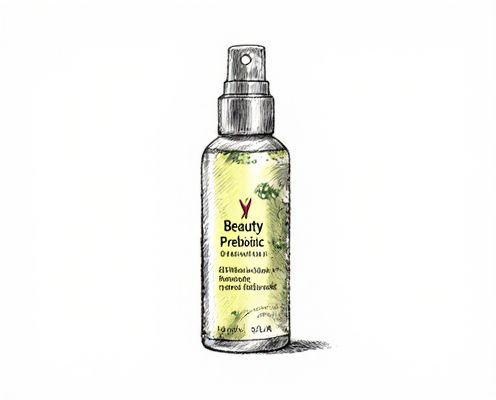
Prebiotic skincare Illustration
Prebiotic skincare enhances the skin's natural microbiome, promoting a balanced environment that supports healthy, radiant skin. By nourishing beneficial bacteria, prebiotic formulations help strengthen the skin's barrier against irritants and reduce inflammation. Regular use leads to improved hydration, fewer breakouts, and a more resilient complexion.
Understanding Prebiotic Skincare: The Science Behind the Trend
Prebiotic skincare harnesses the power of natural ingredients to nourish the skin's microbiome, promoting a balanced environment that supports healthy, radiant skin. By selectively feeding beneficial bacteria, prebiotics enhance the skin's barrier function and reduce inflammation, making products rich in inulin, fructooligosaccharides (FOS), and galacto-oligosaccharides (GOS) highly effective. Scientific studies reveal that maintaining a diverse and thriving skin microbiota through prebiotic formulations can improve hydration, combat irritation, and protect against harmful pathogens.
Key Benefits of Prebiotic Skincare for Women’s Beauty
Prebiotic skincare enhances the skin's natural microbiome, promoting balanced and healthy skin for women. It strengthens the skin barrier, reducing sensitivity and preventing breakouts while improving hydration and overall texture. The key benefits include boosted immunity against environmental stressors, minimized inflammation, and a radiant, youthful complexion.
How Prebiotics Support a Healthy Skin Microbiome
Prebiotics nourish the beneficial bacteria on the skin, promoting a balanced microbiome that enhances natural defense against harmful pathogens and environmental stressors. By stimulating the growth of good microbes, prebiotic skincare helps maintain the skin's barrier function, reducing inflammation and supporting hydration. Consistent use of prebiotics leads to improved skin resilience, decreased sensitivity, and a healthier, glowing complexion.
Top Ingredients in Prebiotic Beauty Formulations
Prebiotic skincare formulations prominently feature ingredients such as inulin, a natural polysaccharide derived from chicory root, which supports the growth of beneficial skin microbiota for enhanced barrier function. Another key ingredient is beta-glucan, known for its anti-inflammatory properties and ability to soothe irritated skin while promoting microbial balance. Lactic acid, a gentle alpha-hydroxy acid, further contributes to maintaining the skin's pH and encourages the proliferation of good bacteria, optimizing skin health in prebiotic beauty products.
Comparing Prebiotic vs. Probiotic Skincare Products
Prebiotic skincare products nourish the skin's natural microbiome by providing essential nutrients that promote the growth of beneficial bacteria, enhancing skin barrier function and hydration. In contrast, probiotic skincare incorporates live bacterial strains directly to introduce good bacteria, aiming to rebalance the skin flora and reduce inflammation. While prebiotics support existing microbes and maintain long-term skin health, probiotics deliver immediate microbial benefits but may have stability challenges in formulations.
Formulation Challenges and Advances in Prebiotic Beauty Products
Formulating prebiotic skincare products requires careful balance to maintain the stability and efficacy of beneficial ingredients while avoiding preservatives that disrupt the skin microbiome. Advances in biocompatible delivery systems and encapsulation technologies have improved ingredient stability, enabling targeted release of prebiotics to nourish skin microorganisms. Recent innovations also emphasize natural, microbiome-friendly formulations that enhance skin barrier function and reduce inflammation without compromising product shelf life.
Consumer Trends: Growing Demand for Microbiome-Friendly Skincare
The beauty industry is experiencing a significant surge in demand for prebiotic skincare products that support the skin's microbiome health. Consumers increasingly prioritize microbiome-friendly formulations containing ingredients like inulin, fructooligosaccharides, and plant-based oligosaccharides to enhance skin barrier function and reduce inflammation. This shift reflects a broader trend toward natural, science-backed solutions that promote long-term skin balance and resilience.
Expert Insights: Dermatologist Opinions on Prebiotic Skincare
Dermatologists emphasize that prebiotic skincare supports your skin's natural microbiome by promoting beneficial bacteria, which helps maintain hydration and reduce inflammation. Clinical studies highlight that products containing ingredients like inulin and beta-glucan enhance skin barrier function and improve overall skin resilience. Expert insights suggest incorporating prebiotics into your routine can effectively balance skin health and protect against environmental stressors.
Best Prebiotic Skincare Products for Women in 2024
Top prebiotic skincare products for women in 2024 harness the power of natural ingredients like inulin, fructooligosaccharides, and lactobacillus ferment to nourish and balance the skin's microbiome. Leading brands such as Mother Dirt, Gallinee, and Aurelia Probiotic Skincare offer formulations that enhance hydration, reduce inflammation, and strengthen the skin barrier for a radiant, healthy complexion. These products prioritize gentle, microbiome-friendly technology that supports long-term skin health and resilience against environmental stressors.
Future Directions: Innovation and Sustainability in Prebiotic Beauty
Prebiotic skincare is evolving with cutting-edge innovations that enhance microbiome balance while prioritizing sustainability through biodegradable ingredients and eco-friendly packaging. Advancements in biotechnology enable the development of targeted prebiotic formulations that support skin health and resilience against environmental stressors. Future directions emphasize integrating circular economy principles to reduce waste and promote long-term ecological benefits alongside effective beauty solutions.
 womendy.com
womendy.com